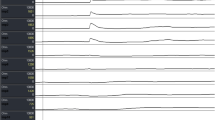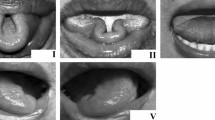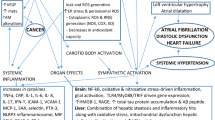Abstract
The present study was aimed to compare chewing performance level and feeding behaviors of children with autism to their typically developing peers. A total of 56 children (37 children with autism, 19 typically developing children) participated in the study. Feeding-related characteristics and observational oral-motor characteristics of children were recorded. The Karaduman Chewing Performance Scale (KCPS) was used to assess chewing performance level, the Behavioral Pediatrics Feeding Assessment Scale (BPFAS) was used to assess feeding behaviors of children, and the Turkish version of the Feeding/Swallowing Impact Survey (T-FS-IS) was used to evaluate the effect of the child’s feeding and swallowing problem on their parents. Results showed that transition time to solid food intake for children with autism was later than typically developing children (p = 0.014), and they had more tongue thrusting (p = 0.009). There were differences between groups in terms of KCPS (p = 0.002), BPFAS (Total frequency score, p = 0.008; Child frequency score, p = 0.017; Parent frequency score, p = 0.021; Restriction score, p = 0.004), and T-FS-IS (Daily activities, p = 0.004; Worry, p = 009; Feeding difficulties, p = 0.031; Total score, p = 0.001). The present study shows that children with autism had worse chewing function and worse mealtime functioning compared to typically developing children. Their parents perceived mealtime behavior as more problematic, and parents’ quality of life related to feeding/swallowing disorders was worse compared to parents of typically developing children. The study results reveal the importance of early assessment and intervention of chewing function and feeding behaviors in children with autism.
Similar content being viewed by others
References
American Psychiatric Association. Diagnostic and statistical manual of mental disorders. 5th ed. Arlington, VA: American Psychiatric Publishing; 2013.
Meral BF. Feeding problems and evidence-based behavioral interventions in children with autism spectrum disorder. JAMA Psychiatry. 2017;18(3):493–508. https://doi.org/10.21565/ozelegitimdergisi.323301.
Diolordi L, del Balzo V, Bernabei P, Vitiello V, Donini LM. Eating habits and dietary patterns in children with autism. Eat Weight Disord-St. 2014;19(3):295–330.
Ghuman JK, Cataldo MD, Beck MH, Slifer KJ. Behavioral training for pill-swallowing difficulties in young children with autistic disorder. J Child Adol Psychop. 2004;14(4):601–11.
Sharp WG, Postorino V, McCracken CE, Berry RC, Criado KK, Burrell TL, Scahill L. Dietary intake, nutrient status, and growth parameters in children with autism spectrum disorder and severe food selectivity: an electronic medical record review. J Acad Nutr Diet. 2018;118(10):1943–50.
Nadon G, Feldman DE, Dunn W, Gisel E. Mealtime problems in children with autism spectrum disorder and their typically developing siblings: a comparison study. Autism. 2011;15(1):98–113.
Gray HL, Sinha S, Buro AW, Robinson C, Berkman K, Agazzi H, Shaffer-Hudkins E. Early history, mealtime environment, and parental views on mealtime and eating behaviors among children with ASD in florida. Nutrients. 2018;10(12):1867.
Marshall J, Ware R, Ziviani J, Hill RJ, Dodrill P. Efficacy of interventions to improve feeding difficulties in children with autism spectrum disorders: a systematic review and meta-analysis. Child Care Health Dev. 2015;41(2):278–330.
Ledford JR, Gast DL. Feeding problems in children with autism spectrum disorders: a review. Focus Autism Dev Dis. 2006;21(3):153–66.
Laud RB, Girolami PA, Boscoe JH, Gulotta CS. Treatment outcomes for severe feeding problems in children with Autism Spectrum Disorder. Behav Modif. 2009;33:520–36.
McAbee GN, Prieto DM, Kirby J, Santilli AM, Setty R. Permanent visual loss due to dietary vitamin A deficiency in an autistic adolescent. J Child Neurol. 2009;24(10):1288–9.
Sharp WG, Berry RC, McCracken C, Nuhu NN, Marvel E, Saulnier CA, Jaquess DL. Feeding problems and nutrient intake in children with autism spectrum disorders: a meta-analysis and comprehensive review of the literature. J Autism Dev Disord. 2013;43(9):2159–73.
Lukens CT, Linscheid TR. Development and validation of an inventory to assess mealtime behavior problems in children with autism. J Autism Dev Disord. 2008;38(2):342–52.
Thullen M, Bonsall A. Co-parenting quality, parenting stress, and feeding challenges in families with a child diagnosed with autism spectrum disorder. J Autism Dev Disord. 2017;47(3):878–86.
Curtiss SL, Ebata AT. The nature of family meals: a new vision of families of children with autism. J Autism Dev Disord. 2019;49(2):441–52.
Hall KD. Pediatric dysphagia. Resource guide. Canada: Singular Thomson Learning; 2001.
Serel Arslan S, Demir N, Barak Dolgun A, Karaduman A. Development of a new instrument for determining the level of chewing function in children. J Oral Rehabil. 2016;43:488–95.
Allen SL, Smith IM, Duku E, Vaillancourt T, Szatmari P, Bryson S, Roberts W. Behavioral pediatrics feeding assessment scale in young children with autism spectrum disorder: psychometrics and associations with child and parent variables. J Pediatr Psychol. 2015;40(6):581–90.
Serel Arslan S, Kılınç HE, Yaşaroğlu ÖF, İnal Ö, Demir N, Karaduman AA. Reliability and validity of the Turkish version of the feeding/swallowing impact survey. J Dev Phys Disabil. 2018;30(6):723–33.
Collins MSR, Kyle R, Smith S, Laverty A, Roberts S, Eaton-Evans J. Coping with the usual family diet. J Learn Disabil. 2003;7(2):137–55.
Le Révérend BJ, Edelson LR, Loret C. Anatomical, functional, physiological and behavioural aspects of the development of mastication in early childhood. Br J Nutr. 2014;111(3):403–14.
Serel Arslan S, Demir N, Karaduman AA. Effect of a new treatment protocol called Functional Chewing Training on chewing function in children with cerebral palsy: a double-blind randomised controlled trial. J Oral Rehabil. 2016;44:43–50.
Arslan SS, Demir N, Karaduman AA, Tanyel FC, Soyer T. The functional chewing training for chewing dysfunction in children with repaired EA-TEF. J Pediatr Surg. 2020;55(4):635–8.
Serel Arslan S, Demir N, Karaduman AA, Tanyel FC, Soyer T. Chewing function in children with repaired esophageal atresia-tracheoesophageal fistula. Eur J Pediatr Surg. 2018;28(6):534–8.
Catino E, Perroni G, Di Trani M, Alfonsi C, Chiarotti F, Cardona F. Application of the Scale for the Assessment of Feeding Interaction (SVIA) to Children With Autism Spectrum Disorder. Front Psychiatry. 2019. https://doi.org/10.3389/fpsyt.2019.00529.
Crasta JE, Benjamin TE, Suresh APC, Alwinesh MTJ, Kanniappan G, Padankatti SM, Nair MKC. Feeding problems among children with autism in a clinical population in India. Indian J Pediatr. 2014;81(2):169–72.
Collins MS, Laverty A, Roberts S, Kyle R, Smith S, Eaton-Evans J. Eating behaviour and food choices in children with Down’s syndrome, autistic spectrum disorder or cri du chat syndrome and comparison groups of siblings: diet and preventive dentistry. J Learn Disabil. 2004;8(4):331–50.
Shmaya Y, Eilat-Adar S, Leitner Y, Reif S, Gabis LV. Meal time behavior difficulties but not nutritional deficiencies correlate with sensory processing in children with autism spectrum disorder. Res Dev Disabil. 2017;66:27–33.
Boudjarane MA, Grandgeorge M, Marianowski R, Misery L, Lemonnier É. Perception of odors and tastes in autism spectrum disorders: a systematic review of assessments. Autism Res. 2017;10(6):1045–57.
Hayes SA, Watson SL. The impact of parenting stress: a meta-analysis of studies comparing the experience of parenting stress in parents of children with and without autism spectrum disorder. J Autism Dev Disord. 2013;43(3):629–42.
Rivard M, Terroux A, Parent-Boursier C, Mercier C. Determinants of stress in parents of children with autism spectrum disorders. J Autism Dev Disord. 2014;44(7):1609–20.
Bauman ML. Medical comorbidities in autism: challenges to diagnosis and treatment. Neurotherapeutics. 2010;7:320–7.
Szatmari P, Georgiades S, Duku E, Bennett T, Bryson SE, Fombonne E, et al. Developmental trajectories of symptom severity and adaptive functioning in an inception cohort of preschool children with autism spectrum disorder. JAMA Psychiatry. 2015;72(3):276–83.
Funding
No funding.
Author information
Authors and Affiliations
Corresponding author
Ethics declarations
Conflict of interest
The authors declare that they have no conflict of interest.
Ethical Approval
All procedures performed in studies involving human participants were in accordance with the ethical standards of the institutional research committee and with the 1964 Helsinki declaration and its later amendments or comparable ethical standards.
Informed Consent
Informed consent was obtained from the participants who participated in this study.
Additional information
Publisher's Note
Springer Nature remains neutral with regard to jurisdictional claims in published maps and institutional affiliations.
Rights and permissions
About this article
Cite this article
Şahan, A.K., Öztürk, N., Demir, N. et al. A Comparative Analysis of Chewing Function and Feeding Behaviors in Children with Autism. Dysphagia 36, 993–998 (2021). https://doi.org/10.1007/s00455-020-10228-6
Received:
Revised:
Accepted:
Published:
Issue Date:
DOI: https://doi.org/10.1007/s00455-020-10228-6




